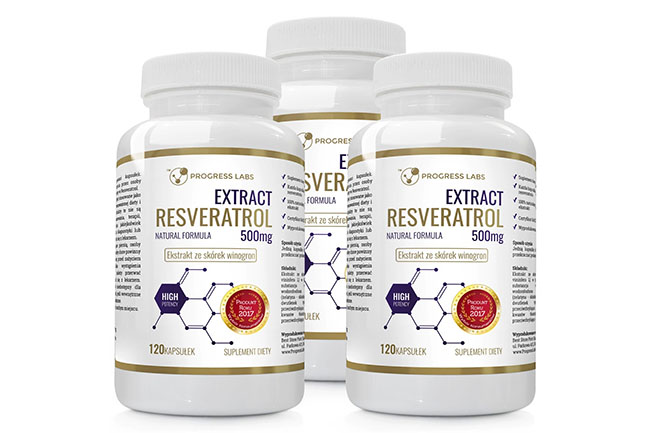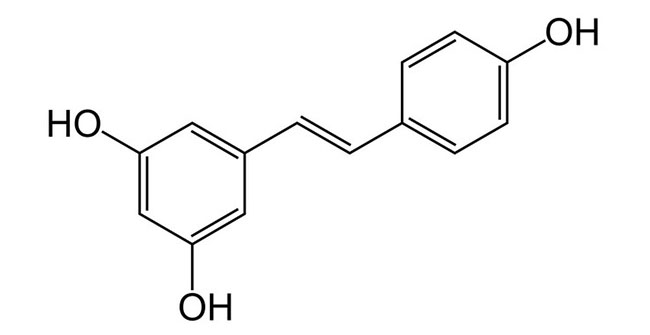Resveratrol has been praised with many flattering and impressive titles including “king of antioxidants,” “brain protector,” “elixir of youth,” “nectar of the gods,” “molecule of youth,” “cosmeceutical secret weapon,” and more.
Ever since Japanese scientist Michio Takoka first extracted it from the poisonous medicinal plant, hellebore, in 1939, resveratrol has been the subject of ongoing scientific debate. Studies are conducted yearly, some substantiating, others refuting the benefits it supposedly possesses. It even has a godfather—biologist David Sinclair—who has dedicated his life to studying it. So, what is it really—the capsule of eternal youth or another dud with inflated marketing hype?
What is It?

Resveratrol is a natural phytoalexin, stilben (an aromatic hydrocarbon, diarylethylene), bioflavonoid, and polyphenol. It is produced by some plants as a defense mechanism against parasites (bacteria, fungi), and ultraviolet radiation.
Scientific name: trans-3,5,4-trihydroxystilbene. Some sources use an alternate spelling for the term—Rezveratrol. It has its own designation in the INCI classification (the international nomenclature of cosmetic ingredients): Resveratrol.
It is produced in plants and wine extracts in factories through fermentation.
Physical and chemical properties:
- in pure form, it is a powder;
- color—all shades of brown, most often—cocoa;
- distinctive smell—strong and sharp, with a musky shade;
- it does not dissolve completely in ethanol and water.
There are two forms of resveratrol in nature:
- Z-resveratrol (Z) — has a strongly pronounced antioxidant effect and can affect genetic transcription.
- E-resveratrol (E) — has greater biological activity, its characteristic attribute is a strongly pronounced anti-inflammatory effect on cancer cells.
Most research is done with trans-resveratrol. This is the form found in the majority of dietary supplement preparations.
It is an organic substance with a complex chemical formula. Therefore, it is difficult to break down the composition into any components. Dietary supplement manufacturers add all sorts of plant extracts, vitamins, and other bioactive ingredients to enhance effectiveness.
Chemical formula: C14H12O3.
Structural formula:

It is available as a dietary supplement with antioxidant, cardioprotective, antidiabetic, and toning properties. Some sports nutrition brands also produce it as a fat burner that helps enhance workout effectiveness and build muscle mass. The main form of issue is capsules and tablets.
Studies
Since the mid-1990s, it has been the subject of all sorts of research. This is related to the activity of David Andrew Sinclair — a famous Australian biologist, professor of genetics, and currently a professor at Harvard University. In 1995, he earned a doctorate in molecular genetics and focused on studying the “elixir of longevity” (this is the term the scientist uses for this phytoalexin in most of his works and interviews).
Most studies have focused on the antitumor properties of resveratrol since an effective cure for cancer has yet to be found. Many scientists (not just Sinclair) believed that it would become a real breakthrough in this area. Another aspect constantly under analysis is its ability to slow down the aging process and extend lifespan.
A brief history of research and results looks like this.
- 1997
Prevents the formation of cancer cells in the skin of mice that were specifically exposed to carcinogens.
- 2002
Reduces the number and size of tumors, prevents the development of stomach and colorectal cancer in rats that were subjected to a special carcinogen attack.
- 2003
Extends the lifespan of yeast, nematodes, and fruit flies.
- 2006
Additional research on mice confirmed the anticancer properties.
First study on humans. 10 volunteers were selected for the experiment. As a result, the assumption that the antitumor properties extended to the human body was refuted. This was explained by the low biological availability.
A study on fish conducted by Italian scientists found an increase in general activity and improved learning ability.
Sinclair confirmed its ability to extend lifespan (experiments with mice were conducted).
- 2007
Prevents the formation of cancer cells in skin that was specially exposed to ultraviolet light. Inhibits the growth of Lewis carcinoma. However, it did not affect melanoma, stomach tumor, or leukemia.
Another group of scientists tested the data from the 2003 studies and refuted the results. No increase in lifespan was found.
- 2011
Study on artificially created synthetic cellular models. Increased apoptosis and decreased tumor growth were observed.
Once again, the ability to extend lifespan was not confirmed.
- 2012
A scientific article by Japanese scientists was published stating that on the basis of resveratrol, a harmless drug can be developed to suppress the Wnt signal (initiates the growth of tumor cells) for the treatment of oncological diseases.
- 2013
Maintains the normal functioning of brain neurons during aging.
As part of the National Institute on Aging’s anti-aging testing program, Sinclair’s mouse experiment (2006) was reproduced exactly. The ability to extend lifespan was not confirmed.
In the same year, South Korean scientists published research results on dogs: a positive effect on life expectancy was obtained.
Conclusions
Most of the aforementioned studies were conducted under the leadership of David Sinclair. These are far from all the experiments and published scientific articles. There is a huge number of them. However, they all have two drawbacks. Firstly, they were carried out on yeasts, insects, and rodents. The only time participants were 10 volunteers, but the conditions of the experiment do not justify drawing thorough and convincing conclusions. Secondly, the results obtained are too contradictory.
Based on this, resveratrol is used only as a food supplement. The putative beneficial properties remain hypothetical for now and need careful verification and confirmation. Therefore, it is not used in pharmaceuticals and is not part of any drug.
Benefits and Harms

Numerous studies have shown the beneficial effects of resveratrol on the functioning of various internal organs and systems. However, its benefits for the body are still in the realm between theory and practical application. There is a lack of larger-scale human trials.
Some scientists (led by Sinclair) see this substance as a panacea for many diseases. Others are extremely doubtful. A similar divide can be seen in the reviews. Some are delighted with the effect of the supplements based on it, while others consider their purchase to be money thrown away.
Health Benefits
Here’s why the body needs resveratrol:
- blocks the spread of tumors;
- reduces the risk of osteoporosis, cardiovascular disease, and liver disease;
- improves the appearance of the skin by stimulating additional collagen production;
- slows down cellular aging as a powerful antioxidant;
- improves microcirculation, prevents thrombosis, lowers cholesterol and sugar, strengthens blood vessels;
- has antiallergic, immunomodulatory, antibacterial, vasodilating, and anti-inflammatory effects;
- binds and removes free radicals from the body;
- improves visual acuity;
- by activating the secretion of progesterone, promotes successful in vitro fertilization and normal embryo development;
- suppresses herpes simplex viruses types I and II, chickenpox, and the flu, cytomegalo
Click to rate this post![Total: 0 Average: 0]


